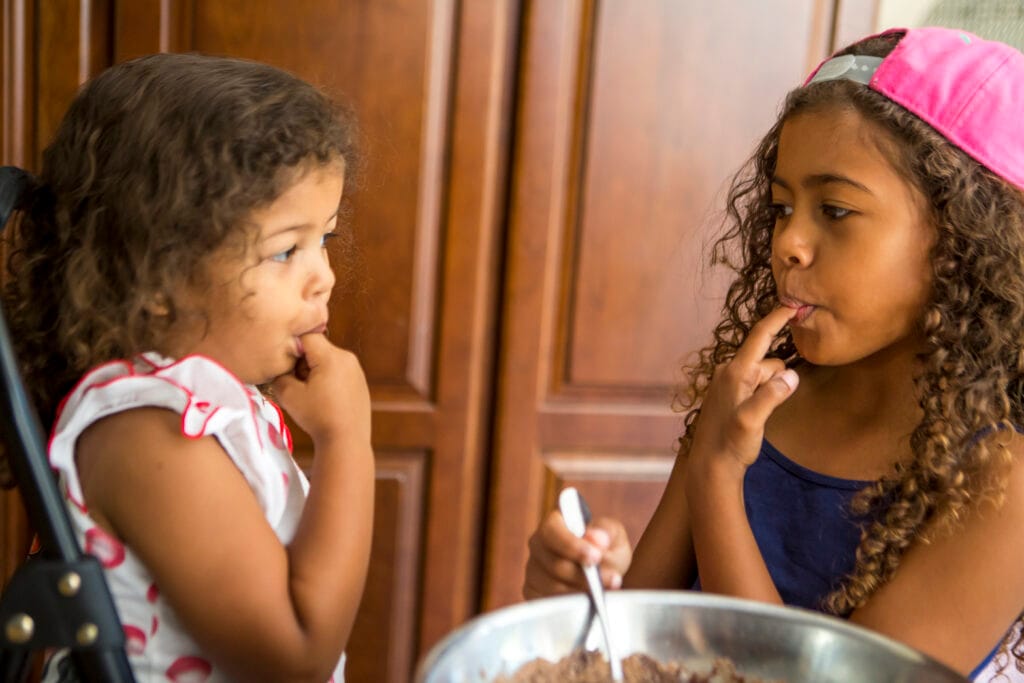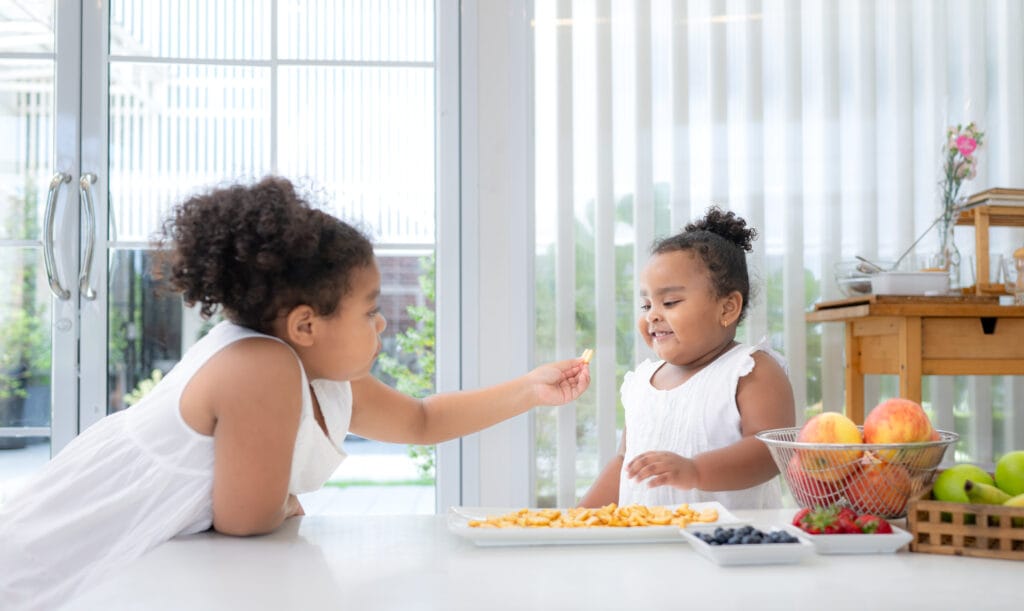Have you ever worried about your toddler eating enough at meals? This is a common worry for parents. But, focusing on fun conversations can make mealtime better for everyone. It helps your child talk more, strengthens family bonds, and encourages healthy eating.
So, what questions can really grab a toddler’s interest? Let’s find out how to make mealtime a time of learning and fun together.
Table of Contents
Why Traditional Mealtime Conversations Often Fall Short
Many parents struggle with healthy eating habits at mealtime. Instead of just talking about food aversions and picky eater tips, experts recommend a change. They suggest moving the conversation to make mealtime more relaxed and fun for toddler feeding schedules.
Common Challenges Parents Face at the Table
Constantly trying to get kids to eat can make them resistant. This can turn mealtime into a stressful event for everyone. It’s especially hard for kids who are cautious or picky eaters.
Impact of Food-Focused Conversations
Parents might unintentionally take over too much at mealtime. This can lead to power struggles and hurt the parent-child bond. Switching to general conversation can make mealtime less stressful and more enjoyable.
Breaking the Cycle of Mealtime Stress
By avoiding a food-focused approach, parents can create a positive mealtime atmosphere. This lets kids feel safe trying new foods. It can help them develop better eating habits and strengthen family bonds.
“Teaching children about food sustainability during meals enhances their understanding of where food comes from and its environmental impact.”
The Power of Positive Mealtime Environment for Toddler Development
Creating a positive mealtime setting is key for toddlers’ growth. It boosts their language skills and vocabulary. It also teaches them table manners for toddlers.
Family meals are a safe space for kids to share their feelings. This helps them develop emotional intelligence and strengthens family ties.
Regular family nutrition for toddlers lets kids discuss important topics. They feel heard and understood. This relaxed setting helps them enjoy healthy eating for kids without stress.
“Mealtimes should be a time for families to come together, share stories, and build connections. When the environment is positive and supportive, it can have a lasting impact on a child’s development.”
Research shows kids who eat with their families often have better communication skills. They also learn good table manners and understand healthy eating. This positive setting encourages toddlers to try new foods and have meaningful talks.
By making mealtime engaging and nurturing, parents help their toddlers grow. This approach supports their physical health and emotional, social, and cognitive development. It sets them up for a lifetime of healthy eating for kids.
Understanding the Division of Responsibility in Feeding
Creating a healthy eating space for toddlers is all about balance. The Division of Responsibility in Feeding helps parents and kids have their own roles at mealtime. This way, everyone knows what to do.
Parent’s Role in Mealtime Management
Parents are in charge of making sure meals are healthy and fun. They need to give portion sizes for toddlers that fit their needs. Also, they should keep meal and snack times the same every day.
By offering different healthy eating habits, parents help kids try new foods. This is the start of good toddler nutrition.
Letting Children Lead Their Eating Journey
Even though parents plan meals, kids decide how much to eat. This lets them learn about their hunger and fullness. It helps them have a good relationship with food.
By letting kids choose, parents avoid fights at mealtime. This makes mealtime less stressful for everyone.
Creating Boundaries Without Pressure
It’s important to set clear rules without being too strict. Parents should not use food as a reward or punishment. This can lead to bad eating habits.
Instead, they should stick to a routine of meals and snacks. This lets kids decide what and how much they want to eat.
“Following the Satter Division of Responsibility in Feeding is key to prevent and solve feeding problems throughout a child’s development.”
By using this method, parents help their toddlers develop good eating habits. This lets kids make smart choices and have a healthy relationship with food.
Questions for Toddlers About Food: Essential Conversation Starters
Talking to your toddler during meals can help them learn to speak and read. Instead of just talking about food, ask questions that connect to their day and what they like. This can make meals more than just eating.
Ask about their favorite part of the day or who they played with. For younger ones, talk about the colors, shapes, or textures of their food. This can make introducing new foods fun and not scary.
- Don’t ask yes-or-no questions. Let your child take their time to answer. This makes meals a chance to bond and learn together.
- A study found that 93% of parents get great answers from their toddlers when asking about playground friends and games.
- 67% of parents say their toddlers love talking about playing outside. It’s a great way to start a conversation.
Using these questions for toddlers about food and engaging food activities can make mealtime better. It helps your child grow and brings your family closer together.

“When asked about the hardest thing they did at school, 45% of toddlers shared activities they struggle with, providing valuable insights for parents.”
The main thing is to talk about what your child enjoys and experiences. This makes meals more fun and valuable for everyone.
Beyond Food Talk: Creative Ways to Engage Toddlers at Mealtimes
Engaging toddlers at mealtimes is more than just talking about food. By adding fun food games, kid-friendly recipes, and sensory experiences, you can make mealtime special. It becomes a memorable time for your little one.
Storytelling and Imagination Games
Mealtime is a great time to spark your child’s creativity. You can tell stories or play imagination games. Ask them to describe their food’s shapes and colors. Or, let them use their plate ingredients to create characters or stories.
Interactive Food Activities
Make mealtime interactive for your toddler. You can create faces on their plate or build structures with food. These activities turn eating into a fun, engaging experience.
Making Memories at the Table
Make mealtime special by starting traditions and sharing experiences. Talk about your child’s day, play word games, or share funny stories. These moments help your toddler see mealtime as positive and memorable.
By using these creative ideas, you can make mealtime enjoyable for everyone. The aim is to create a relaxed, engaging atmosphere. This encourages your toddler to enjoy eating naturally and positively.
Transforming Mealtimes into Learning Opportunities
Mealtimes are great for learning with toddlers. Parents can teach about different foods, where they come from, and their health benefits. Talking about food colors, shapes, and textures helps with senses and words.
Counting food or learning about food groups can start math and science early. Helping with meal prep and setting the table teaches kids responsibility. The goal is to keep it fun and make mealtime a positive time for learning about toddler nutrition and healthy eating for kids.
- Discuss the colors, shapes, and textures of the foods to enhance sensory awareness and vocabulary.
- Count the food items on the plate or discuss the basic food groups to introduce early math and science concepts.
- Involve children in meal preparation and table setting to teach responsibility and develop basic life skills.
- Incorporate introducing new foods into the mealtime conversation to broaden their culinary horizons.
“Mealtimes are not just about filling bellies; they’re opportunities to nourish young minds and cultivate a lifelong love of healthy eating for kids.”
Turning mealtimes into fun learning moments helps toddlers grow curious. It builds a strong, healthy relationship with food. This way, mealtime becomes a joy and sets the stage for a lifetime of good eating habits.

Age-Appropriate Communication Strategies for Different Stages
Talking to toddlers at mealtime helps them grow. But, we need to talk to them in ways that fit their age. Knowing what pre-verbal and early speaking toddlers need helps make mealtime better for them.
Engaging with Pre-verbal Toddlers
Toddlers who can’t talk yet use body language to communicate. Speak simply and use gestures to show what you’re doing. This helps them start learning words.
When they make sounds, like coos or babbles, say “yes” or “no”. This shows them you’re listening and helps them feel connected.
Conversations with Early Speakers
When toddlers start talking, meals become more fun. Ask them simple questions, like “Do you want more toddler meal ideas?” or “Can you point to the healthy snacks for kids?”
Give them time to answer. Use pictures or point to food to help them learn. Introduce new words about food to help them grow.
By talking to toddlers in ways that match their age, we make mealtime better. This helps them grow and can help with picky eater tips.
“Responsive feeding during mealtimes influences a child’s eating habits and language development.”
Building Family Connections Through Mealtime Discussions
Mealtime discussions can really strengthen family bonds. It’s a chance to share stories, talk about plans, and share feelings. Creating a safe space for everyone to talk helps everyone feel heard and valued.
Starting traditions like sharing what you’re thankful for or talking about the day’s best moments can bring families closer. It helps everyone feel connected and united.
Studies show that eating together regularly can greatly benefit kids. It helps them feel secure and improves their social, emotional, and thinking skills. Making family mealtime a priority helps kids learn good eating habits and manners.
When parents have deep talks with their kids during meals, they learn more about their kids’ lives. This helps solve problems and builds strong relationships. Mealtime talks can make a family happier and more united.

1 thought on “Fun Questions for Toddlers About Food: Mealtime Made Easy”
Comments are closed.